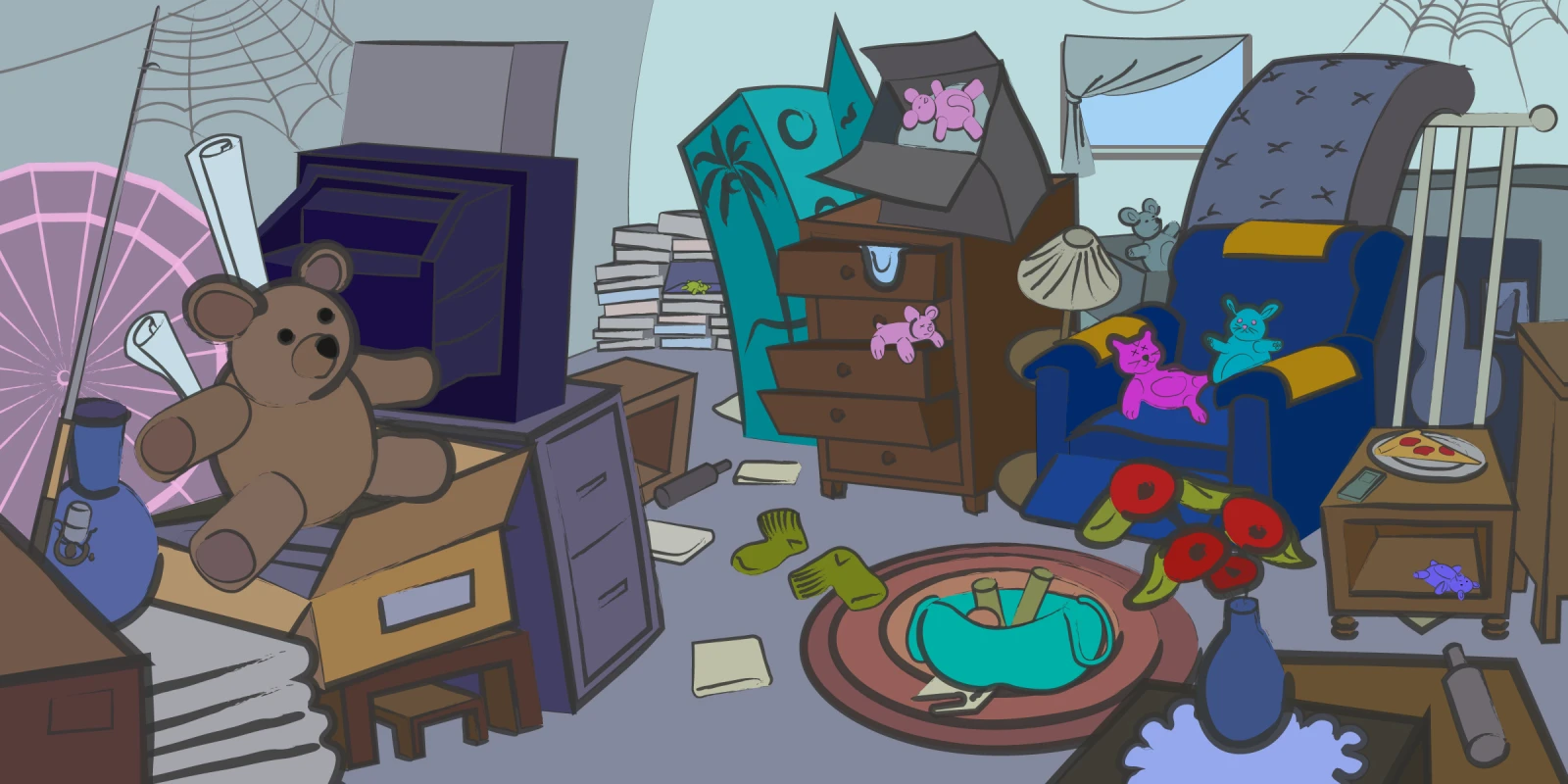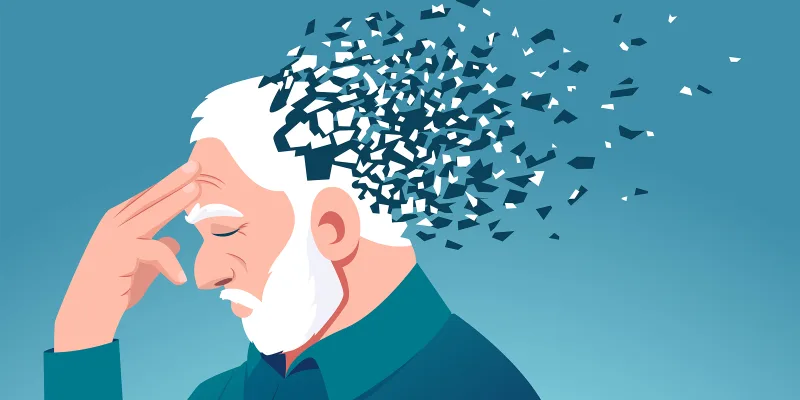This is part of the Medical Humanities series on Op-Med, which showcases creative work by Doximity members. Do you have a creative work related to your medical practice that you’d like to share? Send it to us here.
Hoarders are those who can’t part with possessions,
They’re emotionally attached, it’s become an obsession.
These people are known for their disorganization,
Avoidance, perfection, and procrastination.
They may be depressed, or have OCD,
Grooming disorders or PTSD.
They also have trouble with prioritization,
And don't grasp the meaning of item valuation.
They may exhibit signs of anxiety,
And sometimes they have severe ADHD.
The DSM-V added it to their edition,
They acknowledge that this is a stand-alone condition.
So what are the demographics of this population,
That has this debilitating garbage fixation?
2% of the people estimate the mean,
Symptoms start around the tender age of 13.
Men and women are both affected alike,
When it comes to exactly who hoarding can strike.
It’s sad to see how hoarders’ houses appear,
And if you make a visit, keep the HAZMAT team near.
Their homes are like landfills, from ceiling to ground
Because of their refuse, nothing's ever found.
Hoarders hate waste, so they'll go out junkin’
From picking up a curbside mattress to a rotting Halloween pumpkin.
Their sofa is useless with random debris stacked high,
Beds become storage pallets instead of a place to lie.
Piles of papers they will not discard,
Eight track player buried under a dead St. Bernard.
Broken appliances fill rooms with tags still attached.
Mildewy, torn jeans that are beyond being patched.
Wallpaper's peeling, basement has mold,
Chipped Royal Doulton they swear will be sold.
The garbage is wet and strewn ‘cross the floor
Shower drain hairballs, cat litter, and more.
Towers of expired circulars are reaching high heaven,
And newspapers dated from before 9/11.
Their homes are replete with rodents and fleas
And these are only a few examples of the disease.
They're embarrassed to invite people into their home,
And most of the time they're living alone.
The sickness is much worse as one grows older,
And the burden to clean becomes more difficult to shoulder.
Now there are some hoarding terms you may hear uttered,
That reference this humiliating disorder of clutter.
A 'clean hoard' keeps junk and stuff all over the place,
But a 'dirty hoard' saves decaying carcasses, human, and animal waste.
A 'narrow goat trail' will lead you on an essential path,
To the fridge, or the toilet, or maybe the bath.
'Anger trashing' is odd things thrown on the floor,
'Bitza' is a plastic-cluttered, junk-heaping drawer.
'Clots' are items untouched for half a year,
'Clog' is a room that has clots up to your ears.
'Churning' is no disposal but moving stuff about,
'First pass' is just item by item, sorting things out.
'Undigested clutter' are products unopened,
Whereas 'digested clutter' means that the seal’s actually broken.
'Looping' confirms to the hoarder why the litter is in need,
While touching it increases the bond indeed.
Hoarders need help, or their lives will be shorter,
They'll be trapped under the clutter -- the usual death of a hoarder.
Their home may be blazed, but the firefighters are stuck,
The flames can't be stopped -- the windows are blocked!
Hoarder tenants may face immediate eviction,
For barricading exits, violating safety restrictions.
So who can they turn to, for help and support,
To arrange, and toss, and organize and sort?
Hospital resources available in their brick and mortar,
But the internet can also help the muddled mind of a hoarder.
There's Clutterers Anonymous, and Anxiety/Depression Association,
Children of Hoarders, International OCD Foundation.
All this self-help is found on the cyber,
Webinars are possible if there’s no car nor a driver.
Some towns have hoarding rescue teams in place,
Who intervene when it comes to HD’s worst case.
Police and firemen will extend their good care,
With adult and child and animal welfare.
And how do we treat this terrible disorder,
The one that effects the life of a hoarder?
Meds are an option, but just to be honest,
The effects are only mild, I’d say at best modest.
The first line of drug treatment is an SSRI,
Taken for 3 months and the dosage is high.
60 mg of Paxil is the goal dose,
But it's very hard to tolerate for just about most.
The one major plus is depression will go,
Along with anxiety, as studies have shown.
Effexor 200 mg is another way,
And if combined with OCD, clomipramine's a great TCA.
If there's ADHD, add methylphenidate to the mix,
For those with poor insight, consider atypical antipsychotics.
Cholinesterase inhibitors may work, but the studies are few,
And that rings true for modafinil too.
The gold standard’s CBT – it’s your best bet!
By changing that thinking, hoarding’s less of a threat.
So here are some tips to keep your home clean,
Just halfway presentable, not even pristine.
Empty the sink before you go to sleep,
Get rid of junk mail - there's no need to keep!
Make the bed every morning before getting dressed,
Declutter the house for 15 minutes, no less.
These are some good steps to help hoarders survive,
And lessen their chances of being buried alive.
What was your inspiration? Did other creative works, if any, influence your creation of this piece?
I have a minor in creative writing, because that is truly my passion. Pharmacy just helps pay the bills. I haven't been writing medical poetry since college in the early 2000s.
How long have you been doing this activity? What got you started? How do you relate it to your medical practice?
I had to present a seminar on methotrexate for the treatment of resistant asthma, and my professors loved it. Afterwards, I pursued a master's degree in drug addiction therapy and had written poems for my professors in addition to my assignments. Ultimately, my love for poetry and mental health led me to pursue a PsyD, and I just graduated in April.
Is there anything else you'd like to tell us about your involvement in or views on arts in medicine?
I wish there was more creativity in this field. I'm so happy that I came across this!
Why did you choose this medium? What interests you about it?
My mother is a hoarder, but really, I enjoy writing poetry on all different types of mental health conditions.
LCDR Elizabeth Moham earned her PharmD in 2005 from the Philadelphia College of Pharmacy. She currently practices as a pharmacist for the Federal Bureau of Prisons. Additionally, she earned an Masters in Drug Addiction Counseling and a Doctor of Psychology degree.
Illustration by Jennifer Bogartz







